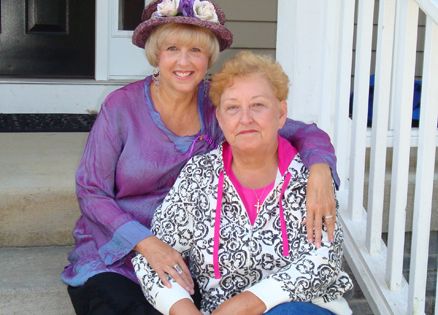I sat with my sister in the hospital chapel, absorbing the doctor’s news. Her son’s legs were paralyzed after surgeries for an aortic dissection and a blood clot. At 34, Lew would live life from a wheelchair.
“I’m so sorry,” I said, sliding my arm around Libby. I felt helpless. Already she cared for her husband, Denny, who suffered from a degenerative muscle disease, along with a host of other ailments. She helped him go to the bathroom, eat, sit up in bed. It was a stressful responsibility, one my sister did with incredible love. Day after day.
I liked helping out in crises and usually knew what to do. But this was different. Overwhelming. How could I ease her burden? I lived 250 miles away. I couldn’t take over Denny’s care and I couldn’t give her back the men she loved most in the world, whole and healed. God, show me what to do. Help me so I can help Libby.
“You’d better get going,” Libby said. “You’ve got a long drive.” In the lobby we hugged. “Do you remember where you parked?” Libby asked, a small smile breaking through the sadness.
“Somewhere in that huge parking garage,” I said. Then I remembered something I’d overheard: a nurse telling a couple there wasn’t much difference in the price of a monthly parking pass and that of a few days. “When I leave, I’ll buy a monthly pass,” I said. “You can share it, so no one will have to worry about parking.” It was a small thing, but it felt good to know I was helping meet a need.
In the months that followed I discovered other ways I and others could minister to my sister. If you know a caregiver, consider these ways to help.
Take them food
When friends came to visit my nephew in the hospital, they brought a bag full of healthy snacks—nuts, apples, bottled juices—for the family sitting vigil in the intensive-care waiting room. “It’s good to have something nutritious to eat when you’re awake in the middle of the night,” Libby told me.
Give a gas card or prepaid card
Expenses mount up for family members driving to the hospital or doctor’s appointments. My friend Rachel was sensitive to my sister’s need. She’d lost her husband to lung disease years ago and remembered the trips she’d made with him for treatment. So she sent Libby a “thinking of you” card with a prepaid gas card tucked inside. “It was one less expense I had to think about,” Libby said. “And the thought meant as much as the money.”
Don’t ask. Do
Caregivers are often too overwhelmed to think of what they need or, as Libby told me, don’t want to admit they need help. I went to visit my sister shortly after Lew went into rehab. Denny’s condition had worsened, and nearly all her energy was devoted to caring for him. One morning I sat in the living room, unsure of what to do, not wanting to bother Libby. Then I noticed a bit of dirt on the floor and grabbed a vacuum.
Soon I found myself sweeping rugs and dusting furniture. It felt good to be busy. I did a few loads of laundry. Before I knew it I was taking down the curtains in the living room and washing the windows, something I never did in my own house. The day I left, Libby stood in the clean room, smiling for the first time in days. “I would never have asked you to do this, but thank you. Thank you!”
Take on yard or repair work
Mowing or, in winter, shoveling snow is always a huge help. My sister called one morning: Her son would be coming home in his new wheelchair. “We’ll have to have a ramp built into Lew’s house,” Libby said. “And make the bathroom handicap accessible.”
I asked my husband, Gary, for help. He’s been in construction for over 25 years. And my son, Brett, buys and rehabs houses for a living. “Don’t give it another thought,” he said. “We’re on it!”
The next weekend, Gary and Brett showed up—each pulling a tool trailer behind his truck. They yanked out walls, installed a handicap shower, laid flooring. Others showed up. Soon the yard was full of power saws. The guys built a ramp in the garage with a new, wider door opening into the house. “It was wonderful to be able to focus on my husband, who needed me so much, and still know my son’s needs were being taken care of—in a grand way!” Libby said.
Give the gift of laughter
One thing my sister and I never had trouble doing was gabbing, but now I wasn’t always sure what to say. I knew she was weighed down by worries, and I wanted to say the right words of comfort. But nothing came. Then I thought of all the good times we’d spent growing up on the farm. “Remember how we had to shell all those ears of corn before we went to bed, so we’d have it for the morning feeding?” I heard myself ask.
She laughed. “I was sure I’d have no thumbprints left.” Soon we were talking about baking cookies, our annual 4-H projects. We laughed like girls again. For a few minutes Libby forgot her worries.
When visiting caregivers, be yourself. Talk about a special memory. Give them a reason to smile. Laughter, clinical studies have shown, is good medicine.
Pray
Even as a friend or relative of the caregiver, don’t shoulder the emotional burden alone. Ask others to pray for the patient and the caregiver. Let caregivers know people are praying. I told the sewing circle at my church, the Kneedle Knuts, about my sister. A few weeks later Libby called. Denny was in the hospital with a fever, his heartbeat unsteady.
I told a woman from the sewing circle that I was going to see Libby. “I have something for you,” she said. It was a beautiful brown prayer shawl.
When I got to the hospital Libby was sitting in the window seat of her husband’s room, reading. “It’s lovely,” she said when I gave her the shawl. She pulled it around her shoulders. “I can feel the prayers.” I spent the night with her in Denny’s room. I woke several times. Each time, Libby was wrapped in that shawl.
Challenging days lie ahead for my sister, but I know God will show me ways to be there for her, if not physically, then in my prayers. And in dozens of other ways that will let her know she’s not alone.
Download your FREE positive thinking ebook!





